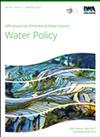巴基斯坦旁遮普农村供水管理的相关因素
IF 1.8
4区 环境科学与生态学
Q4 WATER RESOURCES
引用次数: 0
摘要
自90年代中期以来,旁遮普省公共卫生工程部(PHED)和社区组织(CBO)合作管理巴基斯坦旁遮普省的农村供水系统。在指挥控制管理中,管理RWS的协作方法是独特的。该研究通过分析关系行为作为一种监测和执行机制来解决这一差距,以确保社区遵守政府制定的RWS管理机构。对国会预算办公室成员进行了四次焦点小组访谈,并对来自同一村庄的家庭进行了调查。利用偏最小二乘结构方程模型(PLS-SEM),分析了频繁沟通、用户承诺和共享意义对社区遵守制度的中介影响。这两种方法的综合结果表明,经过培训的社区组织能够更好地自我组织,因为他们经常与社区成员交流。建议为了RWS系统的可持续性,政府对CBO的定期支持强调了合作集体行动的成功,尽管受过培训的CBO在政府监督不力的情况下更好地管理RWS。本文章由计算机程序翻译,如有差异,请以英文原文为准。
The relational factors in managing rural water supply in Punjab, Pakistan
The Punjab Public Health Engineering Department (PHED) and community-based organizations (CBOs) collaboratively manage the rural water supply (RWS) system in Punjab, Pakistan since the mid-nineties. In a command-and-control administration, a collaborative approach to managing RWS is peculiar. The study addresses this gap by analyzing the relational behavior as a monitoring and enforcement mechanism to ensure community compliance with government-produced institutions for managing RWS. Four focus group interviews were conducted with the CBO members and the survey of households from the same villages. Using the partial-least square structural equation model (PLS-SEM), the mediating influence of frequent communication, commitment of users, and shared meaning on community compliance with institutions was analyzed. The integrated results from the two methods imply that trained CBOs better self-organize, as they communicate frequently with the community members. It is recommended that for the sustainability of the RWS system, regular government support for CBOs underscores the success of collaborative collective action, though trained CBOs better manage RWS in weak monitoring by the government.
求助全文
通过发布文献求助,成功后即可免费获取论文全文。
去求助
来源期刊

Water Policy
环境科学-水资源
CiteScore
3.10
自引率
12.50%
发文量
81
审稿时长
6-12 weeks
期刊介绍:
Water Policy will publish reviews, research papers and progress reports in, among others, the following areas: financial, diplomatic, organizational, legal, administrative and research; organized by country, region or river basin. Water Policy also publishes reviews of books and grey literature.
 求助内容:
求助内容: 应助结果提醒方式:
应助结果提醒方式:


